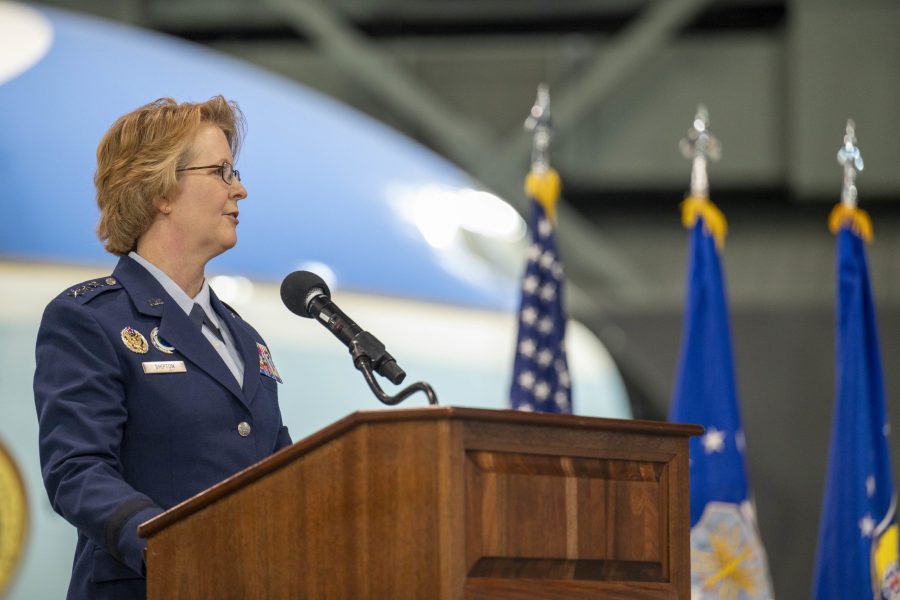Lt. Gen. Donna D. Shipton officially took command of the Air Force Life Cycle Management Center on Jan. 17, vowing to push forward on “continued investment and development to prepare for tomorrow’s conflicts.”
Shipton is the fifth commander of AFLCMC and the first woman to lead the organization, which is responsible for overseeing Air Force weapons systems from inception to retirement—a massive portfolio with a budget of more than $300 billion.
“I believe we can fulfill our Air Force Chief of Staff Gen. Allvin’s charge that we ‘follow through,’” Shipton told AFLCMC members during a ceremony at Wright-Patterson Air Force Base, Ohio. “We can follow through on the hard work that you’ve already been doing to deliver war winning capabilities to the warfighter, while acknowledging the critical work that remains in front of us. It’s no exaggeration to state that without Air Force Life Cycle Management Center-delivered capabilities, the joint and coalition force could not feel the combat power required to win tomorrow’s conflicts.”
The list of new capabilities AFLCMC is working on is extensive, Shipton noted, including the:
- Next Generation Air Dominance fighter
- Next Generation Adaptive Propulsion engine
- Collaborative Combat Aircraft drones
- Next Generation Aerial refueling System tanker
- B-21 bomber and its family of systems
- Hypersonic weapons
Such systems are “top of mind” for Air Force leaders and the U.S.’s adversaries, Shipton said.
“These weapons systems will bolster our continued strategic and tactical advantages, ensuring continued success to highly contested environments and to hold targets at risk around the globe,” Shipton said. “Any target anytime, anywhere. They’ll provide highly resilient communications and kill webs, unparalleled communications and combinations of range, access, and payload that will preserve robust strategic options for our nation’s leaders.”
At the same time, the center will have to sustain and modernize legacy systems too, said Air Force Materiel Command boss Gen. Duke Z. Richardson.
“You’re going to be charged with building our future warfighting systems, while at the same time keeping our current systems healthy,” Richardson told her. “ That’s a challenge. There’s always a tension there, in terms of how you go about doing them. And I’m going to ask you, Donna, to do that by keeping the warfighter and the taxpayer at the front of your mind, because that’s who we really answer to.”
Noting the date of the ceremony marked exactly 33 years since the start of Operation Desert Storm, Shipton pointed to the success of that operation as an example of how new capabilities—precision-guided munitions, GPS, and the E-8C JSTARS—can blend with modernized legacy platforms.
“This conflict demonstrated the decisive outcomes that our Air Force acquisition system can produce, but it also cemented the need for continued investment and development to prepare for tomorrow’s conflicts,” she said.
That imperative is amplified by today’s great power competition, Richardson and Shipton both said. Neither specifically named China, but Shipton warned that in some key weapons and technologies, the U.S. now faces not a near-peer threat, but an equal peer.
“If our work does not succeed, we may find serious strategic disadvantage very soon,” she said.
Shipton comes to the job after a stint as military deputy to the Air Force’s senior acquisition executive, Andrew Hunter. She has also had stops in the National Reconnaissance Office, AFMC headquarters, the F-35 Joint Program Office, and the Space and Missile Systems Center. She previously served as the Program Executive Officer for the tanker directorate in AFLCMC and the senior materiel leader for the Cryptologic and Cyber Systems Division.
The change of command was a long time coming. Shipton was nominated to lead AFLCMC in May 2023, but like dozens of her peers, her confirmation was held up in the Senate for months. Her predecessor, Lt. Gen. Shaun Q. Morris, retired in November; Col. John Kurian had been the acting commander since then.
“It took a little bit longer for me to get here than we all would have liked,” Shipton said. “But thankfully, better late than never. I’m really glad to be here.”

